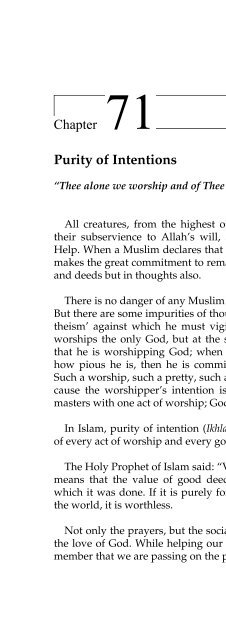You also want an ePaper? Increase the reach of your titles
YUMPU automatically turns print PDFs into web optimized ePapers that Google loves.
Chapter 71Purity of Intentions“Thee alone we worship and of Thee only we seek help”. (Qur’an, 1:5)All creatures, from the highest order to the lowest one, are alike intheir subservience to Allah’s will, and in their dependence upon HisHelp. When a Muslim declares that he will worship his Creator only, hemakes the great <strong>com</strong>mitment to remain faithful to him not only in wordsand deeds but in thoughts also.There is no danger of any Muslim falling into the pitfall of polytheism.But there are some impurities of thoughts which are called ‘hidden polytheism’against which he must vigilantly guard himself. When a manworships the only God, but at the same time likes the people to knowthat he is worshipping God; when he wishes his fellows to appreciatehow pious he is, then he is <strong>com</strong>mitting the sin of hidden polytheism.Such a worship, such a pretty, such a generosity is called polytheism, becausethe worshipper’s intention is not pure, he wants to please twomasters with one act of worship; God and ‘the people’.In Islam, purity of intention (Ikhlas) is the first and basic requirementof every act of worship and every good deed.The Holy Prophet of Islam said: “Verily, the deeds are by intentions” Itmeans that the value of good deed depends upon the intention withwhich it was done. If it is purely for God, it is priceless; if it is to showthe world, it is worthless.Not only the prayers, but the social service also should be based uponthe love of God. While helping our less fortunate brethren, we must rememberthat we are passing on the property of God to the dependents of136





